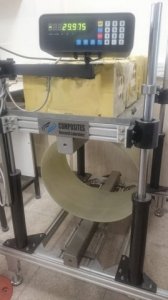
COMRESLAB has performed experimental and theoretical studies on the long-term creep performance of a composite pipe undergoing compressive transverse loading in the framework of applied research contract with NIGC-Boushehr Branch. Firstly, the fundaments of composite pipes, delamination, creep in polymers and also viscoleastic behavior of polymeric composites are presented and then experimental study is performed. In experimental study, a composite pipe is produced and then evaluated using two tests. The first experiment is defining the stiffness level of the pips or the degree to which it can withstand diametric deflection under compressive transverse loading as an indicator of its flexibility. Then, a proper device is manufactured for performing long-term creep test on pipe. The pipe sample is subjected to a constant compressive transverse loading and the variations of diametric deflection versus time is monitored up to 10,000 hours resembling long-term creep test. In the next stage, FE modeling is performed and both interlaminar (i.e. delamination) and intralaminar failure modes are simultaneously taken into account under compressive transverse loading. In other words, the performed stiffness test is accurately simulated using FEM. A very good agreement between the outputs of FEA and experimental observations implies one the proper performance of constructed FE model. In the next stage, the constructed FE model is utilized to evaluate the mechanical response of the pipe experiencing long-term creep. For this purpose, an integrated modeling procedure is developed which is required to perform stress analysis at two levels of micro and macro for simulating the long-term creep response of the pipe. The developed modeling procedure consists of four stages as stress analysis at macro level, stress analysis at micro level, creep modeling in pure resin and composite and updating mechanical properties of the composite layers. The developed modeling is capable of estimating creep response of the pipe up to 10,000 hours based on limited experimental creep data on pure resin as short-term 500-minute tests. The observed discrepancy between experimental observations and theoretical modeling on the long-term creep response of the pipe after elapsing 10,000 hours is just 3%.
COMRESLAB has prepared 5 reports for this project and published 3 articles in research journals as the scientific outputs of the project so far.







 Views Today : 9
Views Today : 9 Total views : 226078
Total views : 226078 Who's Online : 1
Who's Online : 1
